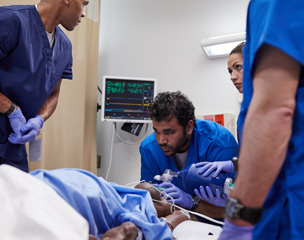-
BLS Certification in Denver
Train for the Moments that Matter
Do you require advanced resuscitation training for your job? American Red Cross Basic Life Support (BLS) classes serve as the foundation of resuscitation training for healthcare professionals in Denver who are seeking to meet competency verification, education, credentialing and privileging requirements.
Advancing Resuscitation Education for Better Outcomes
Our modern, adaptive resuscitation training solutions not only equip you with the latest knowledge to help ensure better outcomes but also are designed to save you time and money.

In-person: Denver Area
Curriculum focuses on the “why” and reinforces critical thinking, decision-making and team concepts to ensure quality care.
Online + Classroom
Adaptive, personalized learning reduces your seat time with innovative eLearning and mastery-based scenarios to reinforce clinical competency.
Want to Become a Red Cross Instructor?
Red Cross Instructors are highly-trained, elite professionals who teach valuable lifesaving skills to more than 5.3 million people each year.
It’s easy and free to bridge to the Red Cross Resuscitation Suite™ BLS, ALS, PALS program. Once you are affiliated with a Red Cross training provider:
Meet the course prerequisites.
Register for the Basic Life Support Instructor Trainer Bridge at redcross.org/take-a-class
Upload the required credentials for approval.
Review the digital course materials.
Upon email approval, launch the online course.
Note: digital course materials are provided with the online course in Red Cross Learning Center under the Materials tab and under Instructor Candidate Resources. You may also purchase course materials at the Red Cross store.
Complete the course and affiliate to a Red Cross Training Provider.
Learn more about our free bridging for Instructors and Training Center Faculty from other organizations. Click on the Instructor Lifecycle tab on the Red Cross Learning Center and follow the prompts for the course(s) that interest you.
Train to a Higher Standard
The cornerstone of the science-based Red Cross BLS course is built upon guidance from the International Liaison Committee on Resuscitation (ILCOR) and the Consensus on Science with Treatment Recommendations (CoSTR), the world’s most authoritative source for resuscitation knowledge.
But we don’t stop there. Unlike other educational providers, the Red Cross curriculum goes beyond a cardiac focus, which makes our programs unique and more robust. Our training incorporates a broader spectrum of scientific recommendations from other recognized professional organizations, including rigorous, expert review from the Red Cross Scientific Advisory Council.
FAQs
Q: What's the difference between BLS and CPR courses?
While they can understandably be confusing, BLS (Basic Life Support) is not the same as a CPR/AED course. CPR/AED courses are designed for non-medical personnel who want the knowledge necessary to recognize and care for someone in cardiac arrest or who is choking. BLS is designed primarily for healthcare professionals including nurses, physicians, EMS professionals and other healthcare and public safety personnel.
Q: What's the difference between ALS vs. BLS?
ALS (Advanced Life Support) builds on the lifesaving skills learned during the BLS (Basic Life Support) course. You must have a BLS certification in order to take ALS. The ALS program trains healthcare providers to care for adult patients who are experiencing life-threatening emergencies such as cardiac arrest, acute coronary syndrome or stroke.
Q: What’s the difference between ALS vs. ACLS?
ALS (Advanced Life Support) is often used interchangeably with the term ACLS (Advanced Cardiovascular Life Support).
Q: What’s the difference between ALS (also known as ACLS) vs. BLS vs. PALS?
Basic Life Support (BLS) is the foundation of resuscitation training for healthcare professionals including nurses, physicians, EMS professionals, and other healthcare and public safety personnel. BLS program content includes single-and multiple-responder CPR (cardiopulmonary resuscitation) and AED (automatic external defibrillator) use, as well as how to care for a patient who has an obstructed airway (choking). The Advanced Life Support (ALS) program trains healthcare providers to care for adult patients who are experiencing life-threatening emergencies such as cardiac arrest, acute coronary syndrome, or stroke. The Pediatric Advanced Life Support (PALS) program trains healthcare providers to care for pediatric patients who are experiencing life-threatening emergencies such as cardiac arrest, respiratory emergencies and shock.
Q: What’s the difference between ALS and PALS?
Both ALS and PALS offer advanced training to healthcare providers in caring for patients who are experiencing cardiac emergencies.
ALS covers adult patients who are experiencing life-threatening emergencies such as cardiac arrest, acute coronary syndrome or stroke.
PALS covers pediatric patients who are experiencing life-threatening emergencies such as cardiac arrest, respiratory emergencies and shock.
Bottom line? Our resuscitation training ensures you know what matters, when it matters. Find a class today.

